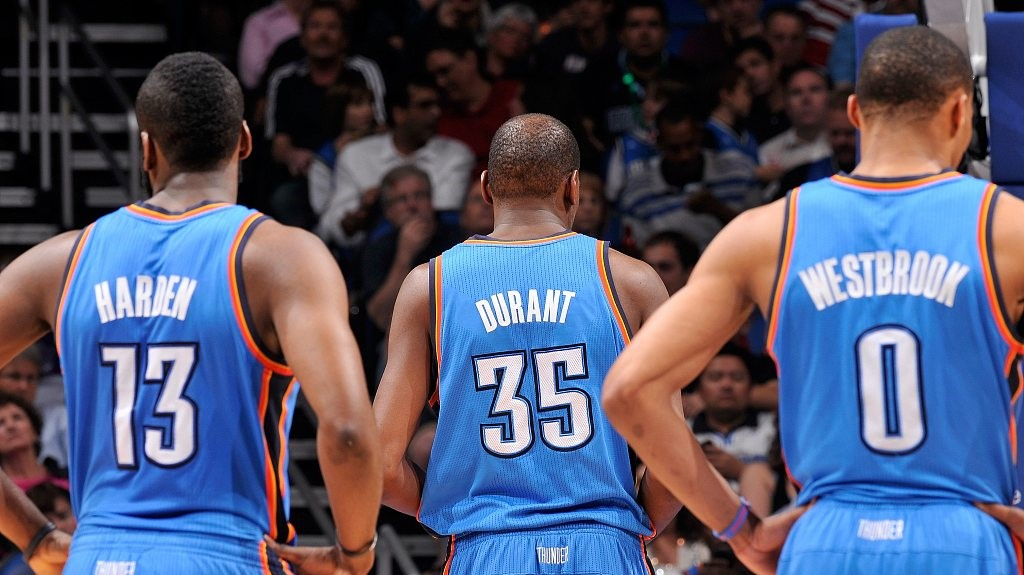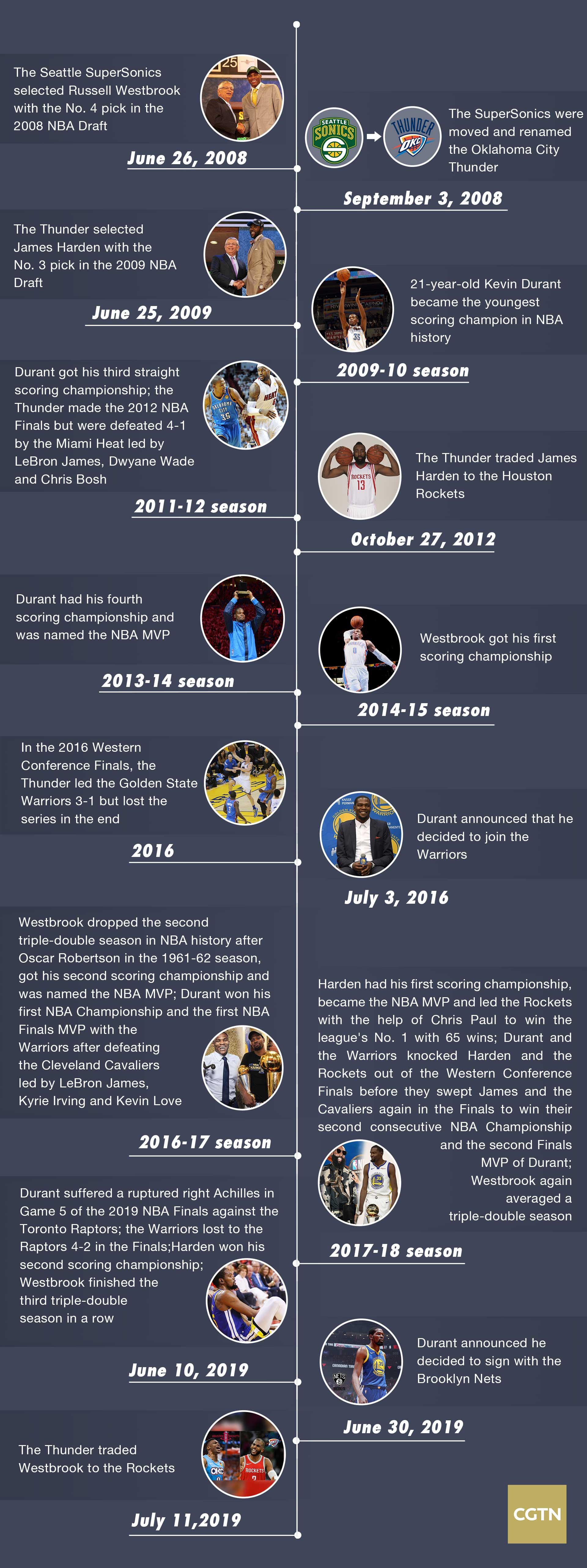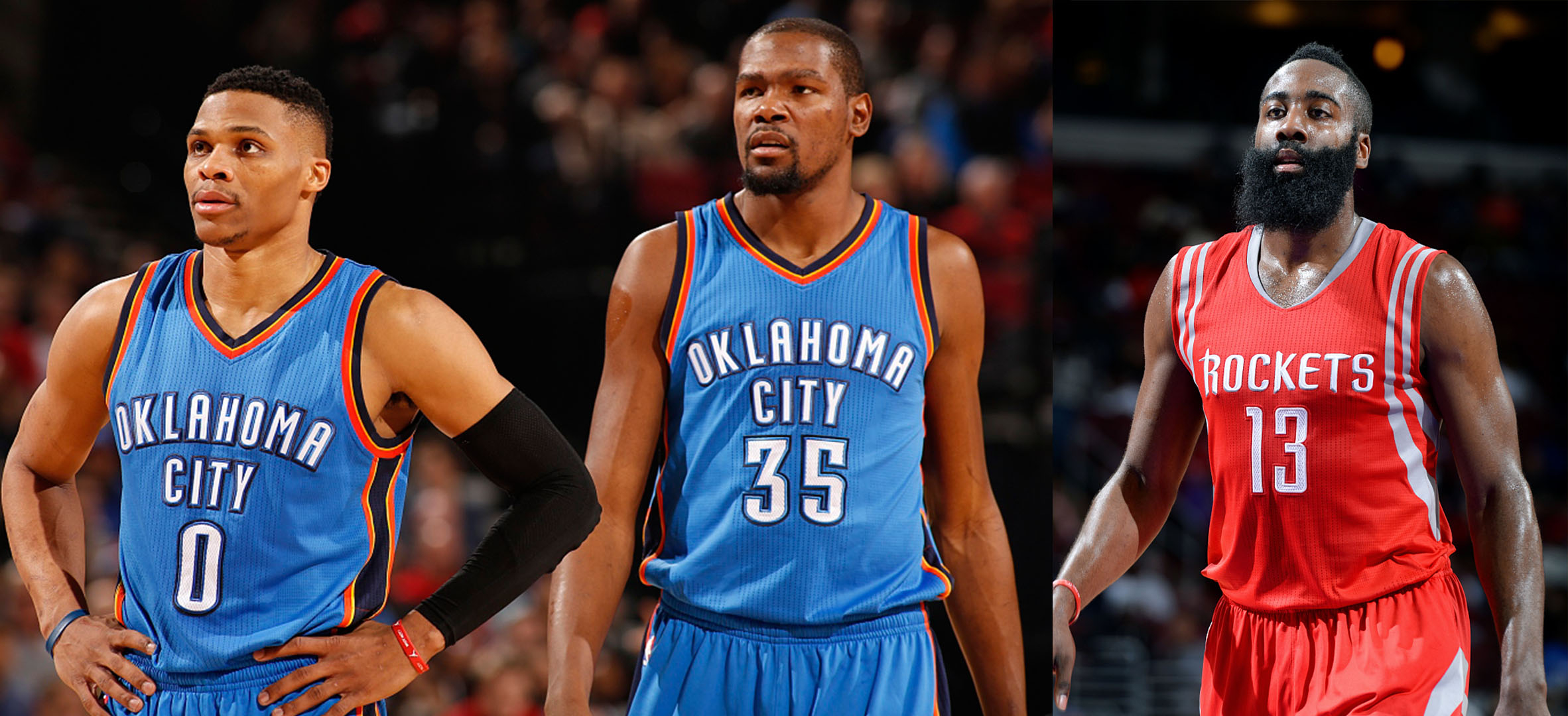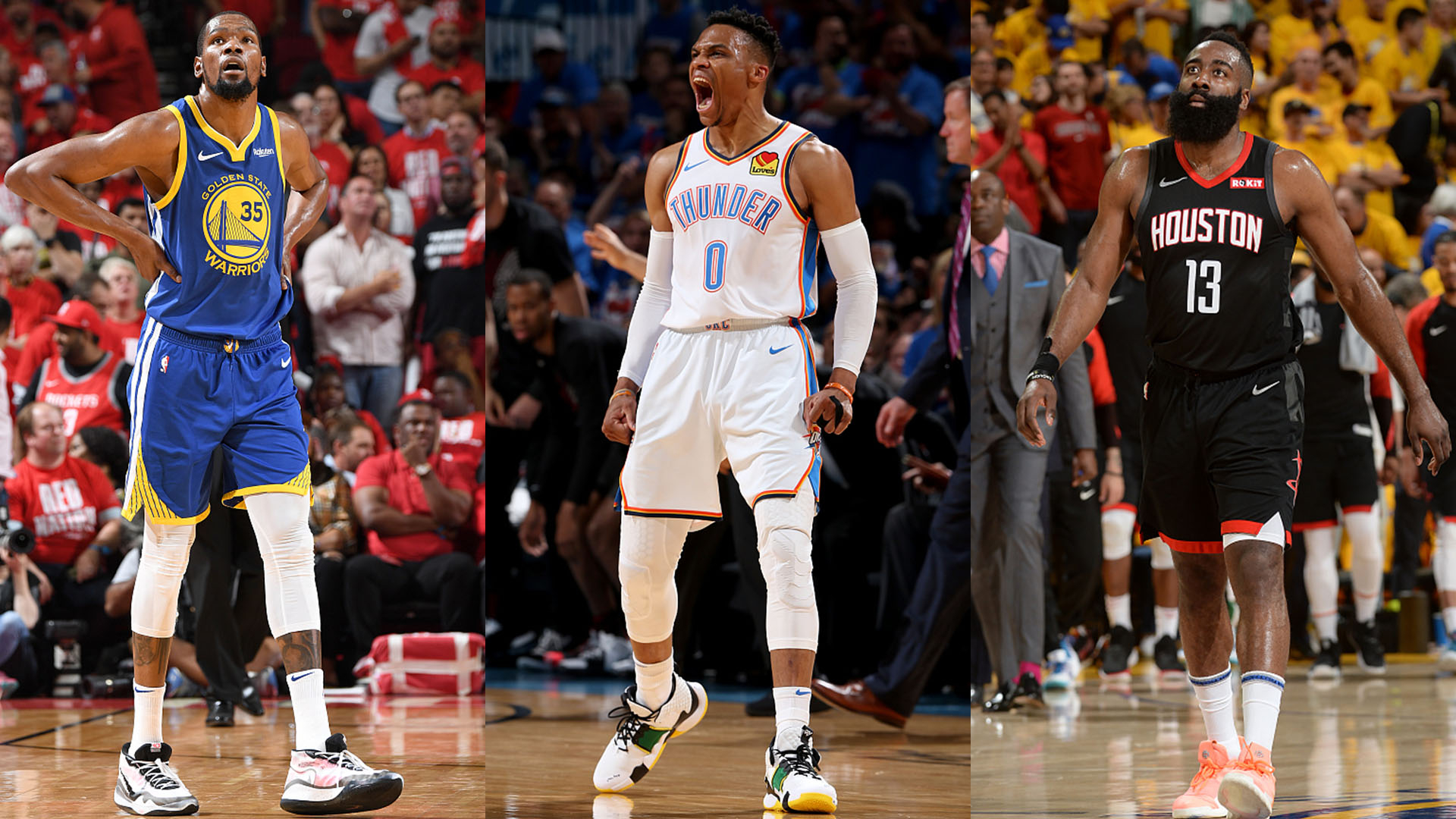

The Oklahoma City Thunder on Thursday sent Russell Westbrook to the Houston Rockets, putting an end to the best era of the team, the "KD-Russ-Harden" era. When you look back, it's hard to define how the team have done during this period of time. OKC had three MVP players – Kevin Durant (2014), Westbrook (2017), James Harden (2018 with the Rockets); however, they never won a championship and the truth is that OKC only made the NBA Finals once in 2012.
Llet's take a look at a short timeline of OKC:

Photo by CGTN's Du Chenxin
The Thunder arrived in Oklahoma City with two valuable assets left by the SuperSonics: Durant and Westbrook, who though were both a long way from growing mature. The first turning point happened in 2009 when the team selected Harden in the draft; head coach Scott Brooks moved Durant from shooting guard to small forward, enabling him to turn on his full power in scoring.
In the following three seasons, Durant got three scoring championships in a row and became one of the best scorers in NBA history. Westbrook began to a threat to the rest of the league with his combination of speed and strength and the remarkable ability of launching fast break. Harden started from the bench but he probably was the best orchestrator of the three, not to mention his mature skill of earning fouls.

Players of the Oklahoma City Thunder (L) in the 2012 NBA Finals and players of the Miami Heat (R) celebrate winning the 2012 NBA Championship. /VCG Photo
In the 2011-12 season, the three young men met the first peak in their careers. They helped OKC eliminate the Dallas Mavericks, the Los Angeles Lakers and the San Antonio Spurs to reach the 2012 NBA Finals. However, though OKC managed to claim victory in Game 1, the inexperienced team watched LeBron James, Dwyane and Chris Bosh lead the Miami Heat come back with four straight wins and win the NBA Championship that year.
Despite the loss, the future still looked bright enough for the Thunder as Durant, Westbrook and Harden were only 23, 23 and 22 years old respectively. Many expected them to dominate the league in the coming three years.
The second turning point then happened and unfortunately, it was not a good one for OKC. In summer 2012, the team had to decide how to keep Serge Ibaka and Harden. First they gave Ibaka a four-year, 48 million U.S.-dollar contract. Nonetheless, the negotiations with Harden did not go well and, for reasons no one could explain, OKC did not extend Harden's deal and traded him to the Houston Rockets. This move also led to a well-known joke: Sam Presti, general manager of OKC, let Harden go for four million U.S. dollars – Harden wanted a four-year, 60-million-deal but OKC were only willing to offer a four-year, 56-million one.

Kevin Durant #35 and Russell Westbrook #0 of the Oklahoma City Thunder and James Harden #13 of the Houston Rockets /VCG Photo
Furthermore, even Durant and Westbrook began to have doubts about their partnership because they seemed to be doing better without the other. In the 2013-14 season, Westbrook missed half of the regular season because of injury, leaving Durant to carry the Thunder and Durant did it. Having dropped 32 points, 7.2 rebounds and 5.5 assists per game, KD led the Thunder to No. 2 in the West with 59 wins and received his first MVP trophy.
Westbrook had a similar season in the 2014-15 when Durant only played 27 games again because of injury. Westbrook put down an average of 28.1 points, 7.3 rebounds, 8.3 assists and 2.1 steals, winning his first scoring championship. Though OKC failed to make the playoffs that season, for the first time in his career, Westbrook was seen as a qualified leader of the team.
The two had the chance to make all doubts disappear in the 2015-16 season as Durant and Westbrook worked together to help the Thunder lead 3-1 over the Golden State Warriors in the Western Conference Finals. However, as the defending champion came back with three straight wins, the last season of Durant and Westbrook working together ended with another failure.
In 2016 summer, Durant made one of the most important decisions in his career: he joined the Warriors. Since then, Durant, Westbrook and Harden opened a new chapter of their careers.

Kevin Durant #35 of the Golden State Warriors, Russell Westbrook #0 of the Oklahoma City Thunder and James Harden #13 of the Houston Rockets /VCG Photo
In the following two seasons, Westbrook and Harden became the two shining stars in the regular season. First Westbrook reproduced the miracle of Oscar Robertson by averaging a triple-double season in 2016-17 and, thanks to that, he defeated Harden to win the first NBA MVP in his career. In response, Harden led Houston to knock out OKC in the playoffs.
Then in the 2017-18 season, Harden reached the peak of his individual career. He was the scoring champion, the MVP and the franchise player who helped the Rockets claim the highest 65 wins in team history. In the playoffs, he and Chris Paul almost defeated the Warriors in the Western Conference Finals as they once led 3-2 in the series.
However, Durant was still the biggest winner of the three. He and the Warriors won two championships in a row and put tow NBA Finals MVPs under his name. They came close enough establishing their own dynasty.
The 2018-19 season became another turning point for the three, and, again, it's a bad one for all of them. Though Westbrook dropped his third consecutive triple-double season, his image in people's eyes began to change from OKC's loyal hero to a stats-stuffer because his performance could not bring victory to the team. Harden continued to leave scoring records but the loss against the Warriors broke various reports about him lacking competitive spirit; Durant was the unluckiest as he suffered a ruptured right Achilles in Game 5 against the Toronto Raptors. The injury not only cost him the third title in a row, but also placed his future career under shadow.

Sam Presti, general manager of the Oklahoma City Thunder /VCG Photo
Summer 2019 witnessed the most shocking offseason in NBA history. First, Durant decided to leave Golden State to join the Brooklyn Nets. Then Reports about Harden and Paul falling out kept hitting the headlines. Then OKC made up their mind to rebuild by sending away Paul George and Jerami Grant. In the end, the team on Thursday traded Westbrook to Houston, putting an end to the 11-year-long, glorious era in the team's history.
OKC, or their general manager Sam Presti, has proved that he has a sharp eye for finding promising young talent – Durant, Westbrook and Harden are all MVPs – but that's probably the only thing he's good at. The team made the first mistake in 2012 summer by letting Harden go and all their misfortune in the following days was the result of this mistake. As a small-market team, OKC could not attract any big name on the market so they had to rely on the youngsters they selected. However, the small market limits the revenues and business for the team and the players, so the front office always found it difficult to keep their best players. In the end, teams like this always ended in the following loop: Underperformance bringing high draft picks; using picks to select young stars; young stars establishing their reputation; young stars leaving the team; the team underperforming.
The only difference between OKC and other small-market teams is that they selected three top-level players so the above process was longer and more painful for the team.

Copyright © 2018 CGTN. Beijing ICP prepared NO.16065310-3
Copyright © 2018 CGTN. Beijing ICP prepared NO.16065310-3